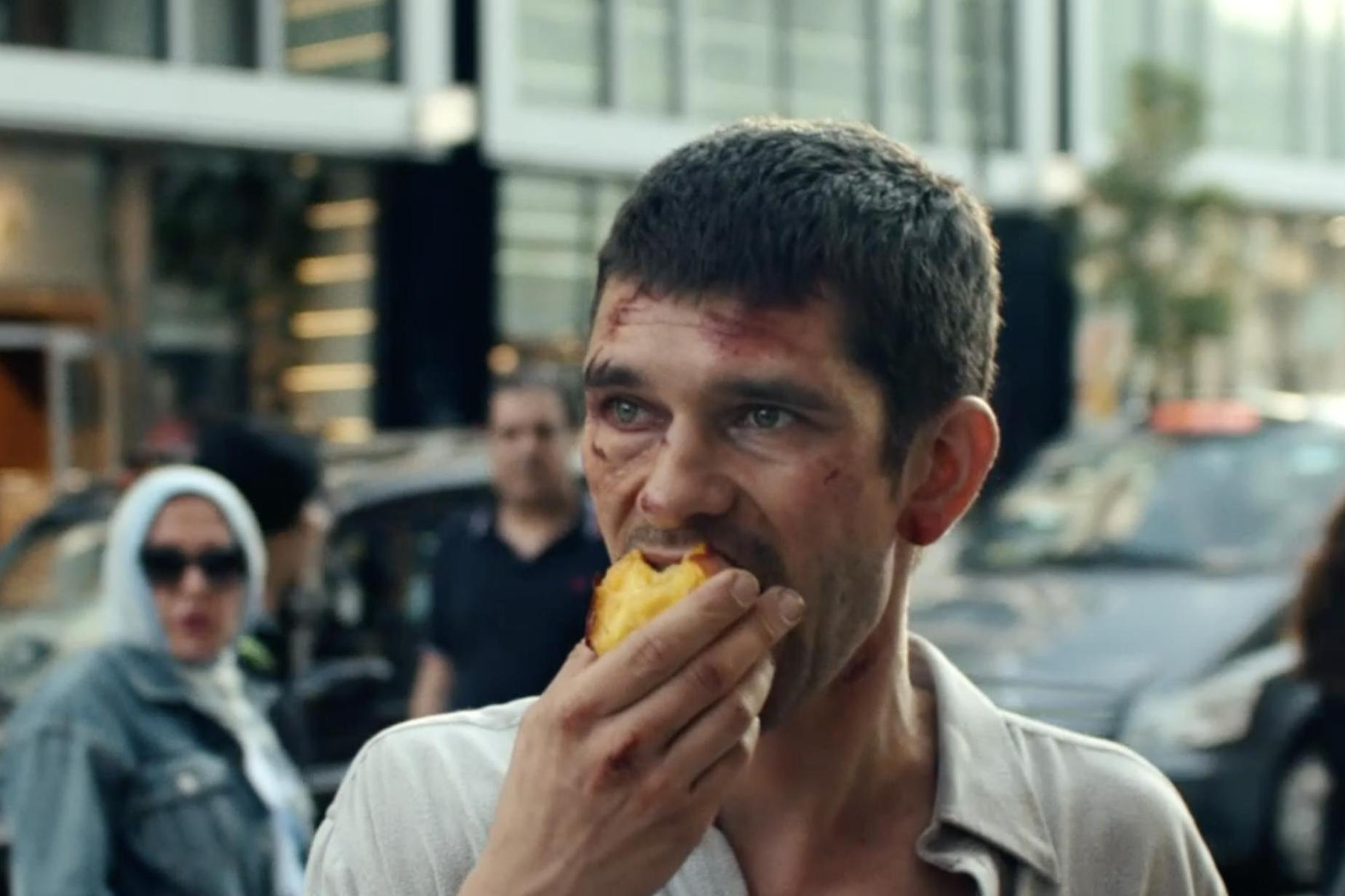Surge is a Melancholicly Brilliant Film – and we all owe Chris a debt of gratitude for the recommendation. So – let’s all say this outloud together… “THANK YOU CHRIS!!!” Good. Because it’s so rare when you find a movie that more than it thinks. To create a film requires so much technical proficiency that it primarily requires head over heart. But with Aneil Karia’s new film, Surge, we experience something entirely different – a sort of melancholic triumph that pulls the heart’s strings so eloquently that it has to be experienced to be understood. Only glitch? At this particular moment, the only way to watch it is to be British. Or to be in England. (Or to have a clever VPN to suss out the problem.) For my British friends (and the more clever among us) you are able to watch Surge right here.
Maybe we should walk through the film – discuss it – and see what comes from unpacking it? But I would definitely avoid reading the rest of this post if you haven’t managed to find a way to watch this film yet. But don’t give up searching it out – it’ll get released widely soon enough.
Surge is a melancholically Brilliant Film – The Surge Movie Walkthrough
I could probably accurately summarize this movie in two sentences. One if allow me hyphenations. But Surge is way more than the sum of its parts. It’s a lyrical, heartfelt investigation into the idea that the world grinds its inhabitants into collective nubs. You know this is true, right? We don’t need a movie to tell us this. But it rings more true when we watch Joseph stumble about his day.
Surge opens as we voyeuristically watch as Joseph (Ben Whishaw – who we’ve seen before in The Lobster) goes to work as a British Airport Security agent. Can you imagine a worse job. Millions of people moving through your office, all of them perpetually stupid both because of the “complexity” that security requires. That and because people on holiday are minus 25 IQ points, and some of us require every single IQ point possible to operate on any given day. You know? Yeah. Anyway, our first run through Joseph’s ‘office’ is a pretty low key baseline of inanity and stupidity. But after Joseph is late getting home, and he misses the 5:22 train, we meet his parents. And if we thought his work situation was bad, we have another thing coming! Oh wow. How is it that this isn’t a movie about a murder suicide? Joseph’s father is one of the worst human beings on the planet. He is. Literally. If there was a competition for the role? He’d win. Hands down. Gah, that man. Sure, Joseph is no Einstein – and yeah – he hasn’t exactly amounted to much. But no one deserves to be treated the way Joseph’s father treats him.
The next day, things go from a 6 on the stress scale to a solid 9. When Joseph goes into work he’s not doing great. He’s chewing on things as a mode of stress relief, and he is incapable of dealing with the various details that require his attention. Joseph even begins breaking the security rules, sending two bags through instead of only allowing one, drinking traveler’s water, just not coping well at all. Eventually, Joseph is spitting water everywhere, and climbing on things. Which is when his supervisor closes his station, and sends him home. Now, I don’t know about you, but I assumed he was fired after this particular performance. No? Regardless, whether he was fired or not, he never goes back.
On his way home, he heads over to Lily’s home to help her with her TV. She had spoken earlier about how her new TV and laptop won’t work together – she can’t get it to work. So, kindly, Joseph helps her out. But it’s pretty obvious that he has a crush on the woman. To fix the TV though, it will require a cable. (Which begins a monumental game of “If you Give a Mouse a Cookie”. If you are unfamiliar with these delightful children’s books, they have to be seen to be believed they are so good. But the formula is simple… If you give a mouse a cookie, he’ll ask you for a glass of milk. And if you give a mouse a glass of milk, he’ll ask you for a straw. And when he is finished he’ll ask for a mirror to see if he has a milk mustache… you get the idea.) But Joseph can’t get the TV cable because the system has a card error. When he goes to the ATM the machine keeps his card. (I’ve had this happen in England before – can confirm – very stressful.) When he goes to the bank, the teller tells him that he will need to give her proper identification. But Joseph doesn’t drive, so he doesn’t have a driver’s license. And the poor guy just wants 4 pounds and 99 pence.
When he walks outside, it’s as if the sound design guy for Surge accidentally fell asleep on the ambient noise nob, accidentally cranking it to 300. The noise in Joseph’s head is off the charts. Really? He is just trying to help a friend out. He just lost his job. He wants a computer cable. Can’t someone realize that the system that we have developed here is chewing this guy up and spitting him out? So what does Joseph do? The natural next logical thing… if you tell a mouse to give proper identification, and he doesn’t have any… the mouse is going to rob said bank. And that is what Joseph does. He slips a not to the teller, and he tells her that he has a gun, and that she needs to give him all her money.
After successfully robbing the bank, he is obviously feeling a surge of elation. He has broken the robot machine that was just a second ago eating his lunch. But now he’s found a way to fight back. So Joseph goes back to the store, purchases a cable, and fixes Lilly’s TV. Afterwards, he is on such a high, Joseph kisses her. The two laugh together at this. And it may very well be the only happy moment in the entire film. Soon after leaving Lilly’s he robs another bank.
Now hold on – let’s be clear about something here. Joseph doesn’t want the money per se. He already has so much money he can’t even carry it. Another reason we know he doesn’t specifically want the money? He doesn’t buy anything with it. Well, he did spend £4.99 on the cable for Lilly. And the next day he buys a banana and a nectarine for a quid. So yeah? But this time, when he steals the money, the teller puts a red smoke can that goes off when he tries to open it.
Realizing he’s probably in a bit of trouble now, he gets a hotel room and lays low. Sort of. Why sort of Taylor? Well… my anonymous friend, Joseph spends his evening in his hotel room destroying the room. He trashes the TV, carves up the mattress, he turns the room into a confetti party. Not done with that mayhem and chaos, Joseph heads down to a wedding party and crashes that next. The best man, who is currently bombing, tells Joseph to leave, but when Joseph whispers something in his ear, he lets him stay. (Bets on what he said to the man? Did he offer him a pile of cash? Literally? I really don’t know. But I’m curious. Anyone with connections to the writers for the screenplay? I can’t find any of them online. Little help? Would love to ask them.)
After the party, Joseph heads back to his apartment, where the idiot that has been revving his quadrunner indefinitely, and Joseph steals it. Well it was just sitting there running, right? It deserved to be stolen. And the guy was a ponce to boot… so yeah, I’m in favor of this particular move. Really in favor of this particular move. As Joseph is speeding down the road, a car pulls out in front of him, and he slams into it, flying into the air, and violently crashing into the pavement. (Can I ask about this shot? How the heck did this little movie pull off this shot? There is no way a stuntman was used to accomplish this shot. No. Was it CG? It was a fantastic shot is all I’m saying.) Soon after the crash, Joseph gets into a fight with one of the guys nearby. Joseph is now finding surges where he can find them… and apparently pain gets his attention just like robbing a bank.

The Ending of Surge Explained
After the fight, and the car crash, Joseph heads home. To his mother’s credit, she is really very worried about him when she sees him. She says something to him at this point in the film that I found very touching. “Every morning before I get up, I say, ‘Just keep him safe. That is all.'” But then when she is looking at all the cuts and bruises he has some how gotten she tells him, “This is not what a good life looks like.” And the camera lingers as Mother and Son commune together – communicating so much through glances and tears. It is a really affecting moment. But when Joseph’s father enters the scene, the magic is shattered. He refuses to say anything good to him, and instead, he calls the police. After, Joseph leaves, robs another bank… and when the teller starts forking over cash, he says, “no, that’s enough…….” Enough for what? Enough to get him caught? Shut down the chaos? Well, as he is leaving, he realizes that the teller has locked him between the two main front doors. Realizing that the game is up, Joseph sits down and waits. Roll credits.
Wait what? Generally I avoid reading other reviews before I do a write up. I’d prefer not to be swayed by other viewer’s ideas or thoughts on a film. But this time, I did go looking for interviews with the Writer/Director Aneil Karia to see what his thoughts were on this his first film. And everything became clear when I saw this comment by Aneil:
“I’m not quite an anarchist, but I do often think about the kind of world we’ve created for ourselves. As a race, as a species we’ve had a lot of freedom to create whatever kind of society and world we wanted. And I often look at the one we did create and think we operate within a really narrow window, we’ve created a very specific and limited sphere of acceptable behaviour.
“I find it interesting to think about how we’ve created a world which works us to the bone and pits us against each other to some extent, and which makes life really damn difficult. We’ve created a somewhat stark system which is antithetical to compassion.
“It’s not like I go around thinking these specific ideas all the time. But living in a large, somewhat difficult city like London, it’s something I think about from time to time.”
Did you catch that? “I’m not… QUITE, an anarchist… BUT… ” We had freedom to create any world we wanted… and I often wonder look at how narrow the window is, this limited sphere of acceptable behaviour. It’s an intriguing point that he is making here. This definition of normal that we’ve crafted. And for someone like Joseph, who lives with a two ton boulder on his chest, we attempt to slap them back in line every time they emote even a little bit. It’s a pretty sad state of affairs really.
I was actually ready to go full Michael Douglas-Falling Down earlier than Joseph was. I was actually impressed he took as long as he did to pop off. But when the credit card machine declined, the ATM went sideways, and the bank went upside down on him? Wow. Give. The. Mouse. A. COOOKKIEEEE!
The really interesting twist to the movie was the fact that Joseph didn’t burn it all down. He never hurt anyone. Only himself. And in the end, when he was trapped, he didn’t commit suicide. Surge stepped outside that well-trod trope and went a different path. Speaks to the deeper problems in our society where we so tightly constrain people to their roles, the library voices. And all for what? To protect normalcy? To protect the gated communities we love so much… their quiet tranquilities, and their standards of normalcy.



